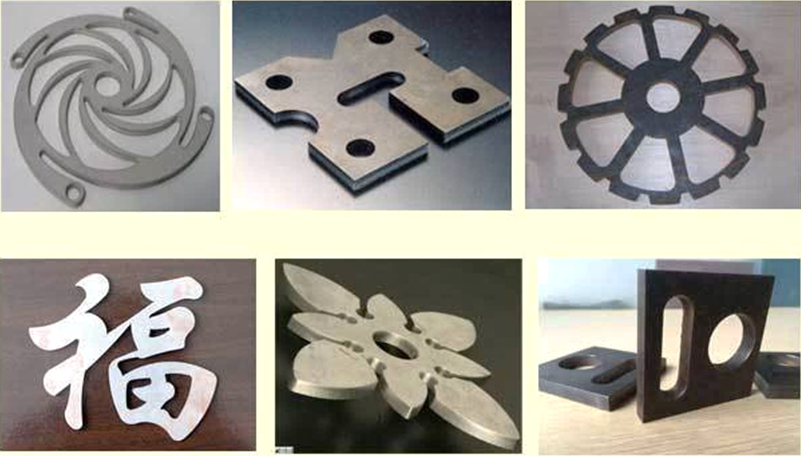Carbon Steel Plate Cutting Machine
The
efficient and economical fiber Laser Cutting Machine adopts international
advanced fiber lasers, speed reducers, servo motors, gears, racks and the like,
has high precision and stable performance, can cut various metal plates, and is
mainly suitable for fast cutting of stainless steel, carbon steel, manganese steel,
copper plates, galvanized plates, various alloy plates, rare metals and other
materials. Applicable industries: sheet metal, precision instruments,
mechanical equipment, metal molds, kitchen and toilet products, auto parts,
craft gifts, jewelry, glasses, lighting, mobile phone communication, digital
products, electronic components, clocks, computer parts, instruments, etc.
Technical Parameters
Type
CE3015
CE4015
CE6015
CE4020
CE6020
CE4025
CE6025
Effective
cutting width (mm)
1500
1500
1500
2000
2000
2500
2500
Effective
cutting Length (mm)
3000
4000
6000
4000
6000
4000
6000
Range
of vertical stroke (mm)
0-80
Input
power
AC380V/50Hz;AC220V/50Hz
Cutting
thickness (mm)
Accroding
to Laser power
Cutting speed(mm/min)
21000
(1000W/stainless δ1mm)
Idle
speed(mm/min)
100000
Maximum
Acceleration (G)
1.2
Position
repeat accuracy (mm)
±0.05
Laser
power(W)
(≤4000W)Accroding
to the requriments
Drive
mode
Precision
rack bilateral drive
Laser
wavelength (nm)
1080
Cooling
mode
water-cooling
Environmental
temperature
5-35℃
Cutting
material
Carbon
steel, stainless steel, alloy steel, copper, aluminum, galvanized sheet
Steel Plate Cutting Machine,Carbon Steel Laser Cutting Machine,Carbon Steel Gantry Cutting Machine,Carbon Steel Plate Cutting Machine Shandong Buluoer Intelligent Technology Co., Ltd. , https://www.buluoercuttingmachines.com
If you use a ring knife to measure the soil bulk density, the steps are generally like this:
1. First, select the location of the soil profile in the field, and then excavate the soil profile. Sampling is performed at the profile level, and each layer is repeated 3 times. If only the soil bulk density of the tillage layer is measured, it is not necessary to dig the soil profile.
2. Place the ring knife holder on a ring knife of known weight and press the ring knife edge straight down into the soil until the ring knife bowl is full of samples. When the ring cutter is pressed in, it should be steady and consistent.
3. Place a knife with a known weight on the ring knife and place the knife edge perpendicularly into the soil until the ring is filled with the sample. When the ring cutter is pressed in, it should be steady and consistent.
4. Use a soil cutter to cut the soil around the ring knife, remove the ring knife that has been filled with soil, and carefully trim away the excess soil on both ends of the ring knife and clean the soil outside the ring knife. The ends of the ring knife are immediately capped to prevent moisture evaporation. Immediately weighed (accurate to 0.01g) and recorded. 5. Simultaneous sampling at the same layer, using an aluminum box to determine the natural moisture content of the soil. Or remove the sample directly from the ring and measure the soil moisture content. The result was calculated by calculating soil bulk density as follows. d = g • 100 / [V • (100 + W)] where: d - soil bulk density (g/cm3) g - ring wet soil weight (g) V - ring knife volume (cm3) W - sample contains Water volume (%).

Spiral Knife Sampling Procedure for Soil Bulk Density Measurement
The ring knife plays an important role in the process of soil sampling. When measuring soil moisture, bulk density and other parameters, the work of the ring knife is very important. It is even more important to use a ring knife in order to be able to more accurately devote to soil research.